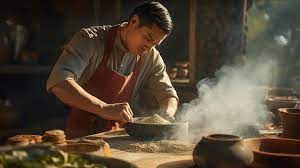The Art of Culinary Craftsmanship
In the world of gastronomy, culinary craftsmanship stands as a testament to the dedication, skill, and passion that chefs pour into their creations. It goes beyond mere cooking; it is an art form that requires precision, creativity, and a deep understanding of flavors.
At the heart of culinary craftsmanship lies the mastery of techniques. From knife skills to sauce reductions, chefs hone their abilities through years of practice and experience. Each dish is meticulously crafted with attention to detail, ensuring that every component is executed flawlessly.
Furthermore, culinary craftsmanship celebrates the use of high-quality ingredients. Chefs source the freshest produce, finest meats, and most flavorful spices to elevate their dishes to new heights. The marriage of top-notch ingredients with expert techniques results in culinary masterpieces that tantalize the taste buds.
But beyond technical skill and premium ingredients, culinary craftsmanship also embodies innovation. Chefs push boundaries, experiment with new flavors and textures, and create dishes that surprise and delight diners. It is this spirit of creativity that keeps the culinary world vibrant and ever-evolving.
Moreover, culinary craftsmanship fosters a deep respect for tradition. Many chefs draw inspiration from classic recipes and cooking methods passed down through generations. By honoring these traditions while adding their own unique twist, chefs pay homage to the rich history of food culture.
In essence, culinary craftsmanship is a labor of love – a harmonious blend of skill, creativity, tradition, and innovation. It is a celebration of food as art and a testament to the endless possibilities that can be achieved in the kitchen.
So next time you sit down to enjoy a beautifully plated dish at a fine dining restaurant or savor a home-cooked meal prepared with care, take a moment to appreciate the artistry behind it all – the art of culinary craftsmanship.
5 Essential Tips to Elevate Your Culinary Craftsmanship
- Use fresh and high-quality ingredients for the best flavor.
- Experiment with different herbs and spices to enhance your dishes.
- Practice proper knife skills for efficient food preparation.
- Master basic cooking techniques like sautéing, roasting, and braising.
- Taste your food as you cook and adjust seasoning accordingly.
Use fresh and high-quality ingredients for the best flavor.
Using fresh and high-quality ingredients is a fundamental principle of culinary craftsmanship that can truly elevate the flavor profile of any dish. By starting with the freshest produce, finest meats, and top-grade spices, chefs can create culinary masterpieces that burst with vibrant flavors and tantalize the taste buds. The quality of ingredients not only enhances the overall taste but also showcases the chef’s commitment to excellence and attention to detail. When it comes to achieving culinary greatness, there is no substitute for using the best ingredients available.
Experiment with different herbs and spices to enhance your dishes.
To elevate your culinary creations and showcase true craftsmanship in the kitchen, don’t be afraid to experiment with a variety of herbs and spices. These flavorful additions have the power to transform a simple dish into a complex masterpiece, adding depth and richness to every bite. By exploring different combinations and quantities of herbs and spices, you can discover unique flavor profiles that will set your dishes apart and impress even the most discerning palates. Embrace the art of seasoning as a key element of culinary craftsmanship, allowing your creativity to flourish and your dishes to shine with tantalizing aromas and tastes.
Practice proper knife skills for efficient food preparation.
To truly embody culinary craftsmanship, it is essential to practice proper knife skills for efficient food preparation. Mastering the art of cutting, slicing, and dicing not only enhances the aesthetics of your dishes but also streamlines the cooking process. By wielding your knife with precision and finesse, you can elevate the quality of your ingredients and ensure that each component is uniform in size, resulting in even cooking and balanced flavors. Proper knife skills are not just about technique; they are a reflection of your dedication to honing your craft and showcasing a level of professionalism in the kitchen that sets you apart as a true culinary artisan.
Master basic cooking techniques like sautéing, roasting, and braising.
To truly embody culinary craftsmanship, aspiring chefs must master basic cooking techniques such as sautéing, roasting, and braising. These fundamental skills serve as the foundation upon which all culinary creations are built. Sautéing imparts quick, intense heat to ingredients, creating depth of flavor and texture. Roasting unlocks rich, caramelized notes and tenderizes meats and vegetables. Braising involves slow cooking in liquid, resulting in succulent dishes bursting with complex flavors. By honing these techniques, chefs can elevate their dishes to new levels of artistry and mastery in the kitchen.
Taste your food as you cook and adjust seasoning accordingly.
One essential tip in the realm of culinary craftsmanship is to continuously taste your food as you cook and adjust seasoning accordingly. By regularly sampling your dishes throughout the cooking process, you can fine-tune the flavors to perfection. This hands-on approach allows you to adjust saltiness, sweetness, acidity, or spiciness levels to achieve a harmonious balance that will elevate the overall taste of your creation. Embracing this practice not only showcases your attention to detail but also ensures that every bite is a delightful sensory experience for those who will ultimately enjoy your culinary masterpiece.

